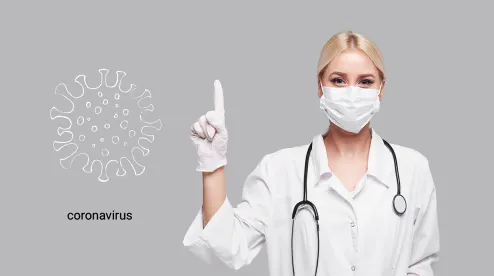Today, OSHA issued long over due guidance relating to the recordability of COVID-19 cases for employers. In short, OSHA has stated that it will not enforce the recordkeeping standard,29 C.F.R. Part 1904, against the majority of employers due to the difficulty in determining whether an employee contracted COVID-19 at work unless there is objective evidence of work-relatedness.
Previously OSHA took the position that COVID-19 can be a recordable illness if a worker is infected as a result of performing their work-related duties. In the new guidance today, OSHA is exercising its enforcement discretion and will not enforce the recordkeeping requirements for employers, unless that employer is in the healthcare industry, emergency response organizations (medical, firefighting or law enforcement) or correctional facilities.
OSHA specifically stated, “In areas where there is ongoing community transmission, employers other than those in the healthcare industry, emergency response organizations (e.g., emergency medical, firefighting, and law enforcement services), and correctional institutions may have difficulty making determinations about whether workers who contracted COVID-19 did so due to exposures at work. In light of those difficulties, OSHA is exercising its enforcement discretion in order to provide certainty to the regulated community.
Employers of workers in the healthcare industry, emergency response organizations (e.g., emergency medical, firefighting, and law enforcement services), and correctional institutions must continue to make work-relatedness determinations pursuant to 29 CFR § 1904. Until further notice, however, OSHA will not enforce 29 CFR § 1904 to require other employers to make the same work-relatedness determinations, except where:
-
There is objective evidence that a COVID-19 case may be work-related. This could include, for example, a number of cases developing among workers who work closely together without an alternative explanation; and
-
The evidence was reasonably available to the employer. For purposes of this memorandum, examples of reasonably available evidence include information given to the employer by employees, as well as information that an employer learns regarding its employees’ health and safety in the ordinary course of managing its business and employees.”
While the memorandum is less clear about reporting COVID-19 positive cases, it is reasonable to infer that if a case is not recordable because it is difficult to determine work-relatedness, then that equally applies to reporting such cases where approriate critieria, such as a fatality or in-patient hospitalization was met. Hopefully OSHA will clarify the scope of this enforcement guidance so employers can rest assured they are in full compliance with OSHA requirements.




 />i
/>i

